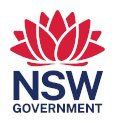Highlights from the 1988 NSW Cabinet Papers
1988 was a big year in NSW politics, with the Coalition ending 12 years of Labor government by winning a landslide election with a swing of 8.3% - the second largest in NSW history. More significantly, the election of the Greiner government ushered in changes that transformed public administration in the state and paved the way for similar reform in other states and the Commonwealth. The reforms remain in place and the key ideas underpinning these reforms continue to be reflected in policymaking today.
Following are the key Cabinet decisions for the period up to the beginning of September 1988, the current period of open access to the State Archives Collection. Over 240 matters were considered by Cabinet during this time.
Luna Park redevelopment
On 16 February the Unsworth Cabinet considered a minute seeking approval in principle for the proposed redevelopment of Luna Park by Prome Investments. In 1981, Cabinet had approved the grant of a sub-lease of the site to Harbourside Amusement Parks Pty Limited, which NSW Police suspected crime boss Abe Saffron was behind (according to evidence to a federal commission of inquiry), and under a clause in the sub-lease Harbourside had to seek consent from the Government to assign the sub-lease to another party (Prome). Prome had several controversial shareholders: Tricontinental, whose lending practices brought down the State Bank of Victoria in 1991; and Entrad, which was controlled by Abe Goldberg, an international fugitive who was the subject of an ASIC arrest warrant after siphoning off funds from the collapsed Linter Group in 1990.
AMP corporate restructure
On 9 March the Unsworth Cabinet approved the preparation of legislation to reduce ‘restrictive’ controls on AMP by allowing it to become a company limited by guarantee. The Attorney General’s Cabinet minute argued that the change was necessary as the act under which AMP operated - Australian Mutual Provident Society’s Act 1910 - was restrictive, inflexible and not consistent with the new environment of financial deregulation in Australia.
ICAC establishment
On 24 May, the Greiner Cabinet approved the preparation of legislation to establish the Independent Commission Against Corruption, the first dedicated anti-corruption in Australia and today one of the oldest and most powerful in the world. Other Australian states and territories did not set up anti-corruption bodies until the 2000’s, while the Commonwealth is yet to establish one.
Closure of State Brickworks
On 26 May the Greiner Cabinet approved the sale of the State Brickworks, together with Homebush Abattoir, after concluding there was there was no ‘public good’ in the state making bricks when there was a competitive private market. It was emblematic of the subsequent withdrawal from state ownership of other commercial businesses, including the State Bank, GIO, and furniture factory and printing business.over the following decades in NSW and around Australia.
Other decisions
Gun control
On 25 January 1988, less than a month before the government called the election, the Unsworth Cabinet’s Policies and Priorities Committee approved legislation to reduce the number of firearms in the community by restricting the classes of persons entitled to possess a firearm.
Expansion of National Parks
On 28 January the Unsworth Cabinet approved the establishment of over 80,000 hectares of new and expanded national parks and nature reserves in south east NSW. The decision also provided compensation and re-employment for 53 forestry workers affected by the resulting closures of the Bega and Bombala sawmills.
Freedom of Information
On 31 May, Cabinet approved the introduction of Freedom of Information (FOI) legislation to give the public a statutory right to access government records, subject to certain exemptions. Prior to this, public access to records was solely at the discretion of Ministers and public servants, and no appeal process existed when access was denied.
Long distance bus services
On 24 May the Greiner Cabinet decided to remove licence restrictions and allow long distance bus services to compete with existing bus and rail services. In recommending the change, the Cabinet minute referred to a trial of competitive services by the Unsworth Government in 1986-87 on the North and South Coasts which delivered benefits to travellers, including lower fares, higher frequencies, and more direct and accessible services.
Sydney Olympic Games bid 1996
On 6 October, the Greiner Cabinet endorsed Sydney Olympic Games Citizens’ Council application to the Australian Olympic Federation to host the 1996 Games. Consistent with the Greiner Government’s commitment to fiscal restraint, the approval was conditional on the games being staged at no net cost to the taxpayer.

